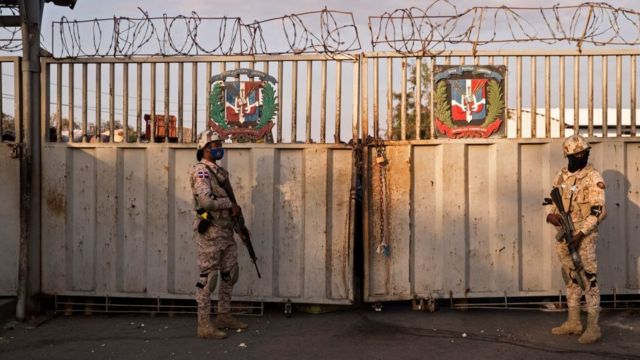Nigeria Cannot Afford Another World Cup Absence: Musa's Warning

Table of Contents
The Economic Impact of World Cup Qualification for Nigeria
World Cup qualification translates to substantial financial benefits for Nigeria, far beyond the realm of mere sporting achievement. The economic impact reverberates across various sectors, creating a ripple effect of prosperity.
Revenue Generation (Sponsorship, Merchandise, Broadcasting Rights)
- Sponsorship Deals: Qualification significantly boosts sponsorship opportunities, attracting lucrative deals from both domestic and international brands eager to associate with the national team.
- Merchandise Sales: The demand for Super Eagles jerseys, merchandise, and related paraphernalia skyrockets during World Cup campaigns, generating significant revenue for the Nigerian Football Federation (NFF) and licensed vendors.
- Broadcasting Rights: Television rights for World Cup matches command exorbitant fees, providing a massive revenue stream for broadcasters and contributing to the national economy.
- Quantifiable Data: While precise figures are difficult to obtain, the economic boost from Nigeria's previous World Cup appearances is undeniable. Studies on previous tournaments show a clear correlation between participation and increased tourism, hospitality spending, and overall economic activity.
Boosting National Pride and Unity
Beyond the financial gains, World Cup qualification fosters a powerful sense of national unity and pride. The collective passion and support for the Super Eagles transcend ethnic and regional divides, bringing Nigerians together in a shared national identity.
- Unifying Force: The success of the national team acts as a unifying force, fostering a sense of collective achievement and national pride.
- Social Cohesion: Previous World Cup performances have served as powerful reminders of Nigeria’s potential and have inspired a collective sense of national identity and purpose. The shared experience of supporting the Super Eagles builds social capital and strengthens community bonds.
- Intangible Benefits: The intangible benefits of national pride are immeasurable, boosting morale and fostering a positive national image on the global stage.
Analyzing Nigeria's Recent World Cup Failures
Nigeria's failure to qualify for recent World Cups stems from a confluence of systemic issues that require urgent attention.
Identifying Systemic Issues within Nigerian Football
- Weaknesses in Youth Development: A lack of robust youth development programs hinders the production of world-class talent.
- Coaching Deficiencies: Inconsistency in coaching appointments and a lack of long-term strategic planning undermine team performance.
- League Infrastructure: The domestic league lacks the necessary infrastructure and professional standards to nurture talent.
- Corruption and Mismanagement: Allegations of corruption and mismanagement within the NFF have negatively impacted the national team's performance.
Comparison with Other African Nations
Examining the successes of other African nations that have qualified for recent World Cups reveals valuable lessons. Senegal, Morocco, and Cameroon, for example, have demonstrated the importance of strategic planning, youth development, and strong governance in achieving World Cup qualification. Analyzing their successes and contrasting them with Nigeria's challenges highlights areas where improvements can be made.
Ahmed Musa's Call to Action: A Roadmap for Success
Ahmed Musa's warning serves as a clarion call for urgent reform and systemic change within Nigerian football.
Key Recommendations Outlined by Ahmed Musa
While specific recommendations may vary, Musa’s message consistently emphasizes the need for improved youth development, better coaching strategies, and transparent football administration. (Further details on specific recommendations made by Musa should be added here if available).
Necessary Reforms in Nigerian Football Administration
- Transparency and Accountability: Establishing transparent and accountable governance structures within the NFF is paramount.
- Improved Investment: Increased investment in grassroots football, youth development programs, and coaching education is crucial.
- Private Sector Investment: Exploring opportunities for private sector investment and public-private partnerships can enhance resource mobilization and efficiency.
- International Partnerships: Collaborating with international football organizations and experts can provide valuable technical support and knowledge transfer.
The Role of Nigerian Football Fans and the Media
The collective effort of Nigerian fans and media plays a vital role in shaping the future of the Super Eagles.
- Positive Support: Constructive criticism and passionate, positive support are crucial for boosting team morale and fostering a supportive environment.
- Responsible Reporting: The media has a responsibility to promote responsible reporting, holding the NFF accountable and advocating for transparent governance.
- Fan Initiatives: Fan initiatives to support the team, such as fundraising campaigns or community-based football programs, can help mobilize resources and build a stronger football culture.
Nigeria Cannot Afford Another World Cup Absence: A Call to Action
Nigeria's World Cup participation is not merely a sporting event; it’s a matter of national pride, economic growth, and social cohesion. The evidence is clear: qualifying for the World Cup brings substantial economic benefits and strengthens national unity. However, systemic issues within Nigerian football are hindering progress. Ahmed Musa's warning underscores the urgent need for comprehensive reforms. We must address the weaknesses in youth development, improve coaching strategies, and ensure transparent governance within the NFF. Securing a place in the next World Cup requires a collective effort from the NFF, coaches, players, fans, and the media. Let us support initiatives aimed at improving Nigerian football, engage with relevant football governing bodies, and demand accountability. It's time to return Nigeria to its rightful place on the world football stage – let's make Nigeria's World Cup dream a reality.

Featured Posts
-
 El Flujo Ilegal De Armas Republica Dominicana Como Puente Entre Estados Unidos Y Haiti
May 14, 2025
El Flujo Ilegal De Armas Republica Dominicana Como Puente Entre Estados Unidos Y Haiti
May 14, 2025 -
 Zdrajcy 2 Odcinek 1 Konflikty Graczy I Materialy Dodatkowe
May 14, 2025
Zdrajcy 2 Odcinek 1 Konflikty Graczy I Materialy Dodatkowe
May 14, 2025 -
 Your Guide To Pokemon Go Events In May 2025
May 14, 2025
Your Guide To Pokemon Go Events In May 2025
May 14, 2025 -
 Untold Judd Family Stories Wynonna And Ashleys New Docuseries
May 14, 2025
Untold Judd Family Stories Wynonna And Ashleys New Docuseries
May 14, 2025 -
 Eurojackpot Oikea Rivi Ja Tulokset Ilta Sanomat
May 14, 2025
Eurojackpot Oikea Rivi Ja Tulokset Ilta Sanomat
May 14, 2025
